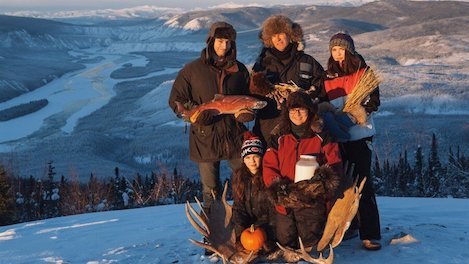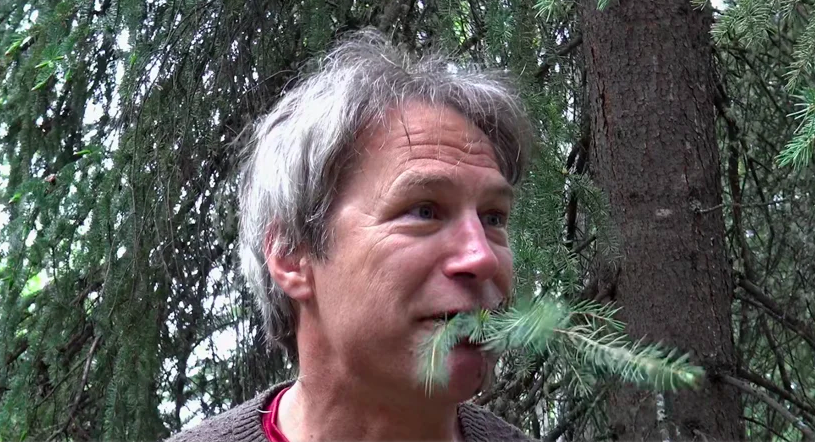First We Eat
By Kevin Piller, Logistics Team Lead
Some say the most overlooked ingredient in cooking is time. It’s certainly the most important factor in growing the food we cook as well. But equally under appreciated is place and the ways in which both we and our food interact with the earth. Sometimes though, the places we choose (or don’t choose) to live require us to adapt and solve issues of food insecurity. Suzanne Crocker’s film First We Eat addresses all of these issues. In her movie, Crocker challenges her family to eat nothing but food grown, gathered, or hunted in Dawson City, Yukon Territory. That means, no salt, no refined sugar, no imported food whatsoever. That’s no small feat given that 97% of all food sold in Dawson City is trucked in. Over the year-long challenge, there are tears, fears, mud, blood, and community. I’m not kidding about the blood either.
Promotional image for the documentary, First We Eat, visit https://firstweeat.ca/
The overarching structure of the film centres around the seasons: summer’s sunny optimism and a gathering of food for the chilly months; autumn’s trials and triumphs as harvest tapers off; wintry discontent and desperation; and finally a rejuvenating celebration of spring. This organization of ideas helps to highlight both the importance of time as an aspect of food procurement and preparation, but also contradicts the notion of food insecurity as a static or binary experience.
Our partners on the frontlines can tell you that food security comes and goes and issues like the COVID-19 pandemic add further difficulties.
Image from the documentary, First We Eat
For the Crocker family, the real threat of food insecurity and sticking with their local diet came when Gerard struggled to hunt a moose. Locally sourced plant based protein simply doesn’t exist in the Yukon, so the pressure was on. To provide enough for their family and stay within the rules of their challenge, it took a serious amount of patience and time invested into learning unfamiliar hunting and gathering techniques. First We Eat shows that time is a critical component of food security that must also be given respect, both for producers and consumers.
While our modern workaday lives don’t afford much in the way of time to practice these methods of food procurement, the simple fact remains that geography is a major factor in the cost of shipping food to the Yukon. Yet this area has been inhabited for thousands of years without a modern supply chain. It’s for this reason that traditional food systems and inherited knowledge from and within northern First Nation and Inuit communities are essential in solving issues of northern food insecurity. Understanding what food is available where and when takes practice, a bit of luck, and respect for the earth. Crocker shows that it’s a hard lesson to learn, and the theme that food is not just nourishment, but a gift from nature that presents itself, is touched upon by Gerard and early in the film Tr’ondëk Hwëch’in elder Angie Joseph-Rear.
While modern consumption driven by convenience is at odds with the reality of life in the north, First We Eat shows that using what the land has to offer to feed and nourish entire communities is a realistic and sustainable way forward. This movie is a love letter to the long list of food producers and educators, like Angie Joseph-Rear, who exemplify food sovereignty north of 60. For some, food sovereignty means bringing foreign farming practices to the north, fording cattle to an island farm, or breeding ultra-hardy varieties of apples—the producers knew that creating a local food system was possible in the Yukon. For others, like the Tr’ondëk Hwëch’in First Nation, who traditionally hunted and gathered food, it means starting the northernmost First Nations owned and operated farm in Canada. But overall, it’s love of community and a deeper understanding of place that drives food production innovation in Dawson City.
There’s a lot of love in First We Eat. The people that grow Dawson City-centric food and the locavores that eat it show that pursuing a more secure, less transportation-dependent food system is possible. And love is the motivation: love for your family, your community, and your planet. Crocker and her family took on the challenge themselves but First We Eat puts the community leaders and the innovators front and centre, and their deeper understanding of the Yukon and how it can support the people who live there. To find out how you can watch First We Eat, visit https://firstweeat.ca/current-screenings/.


